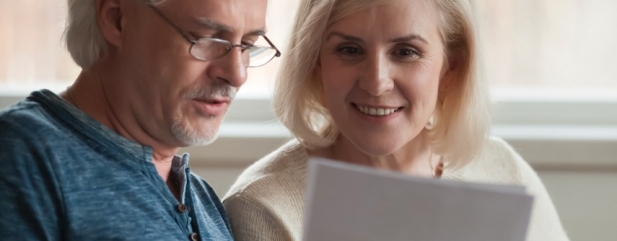Archived article
Please note that tax, investment, pension and ISA rules can change and the information and any views contained in this article may now be inaccurate.
Preparing for a potential capital gains tax raid

Everyone knows the UK Government is going to have to raise taxes to try and get the public finances in order once the pandemic is in the rear-view mirror. Capital gains tax looks like a prime candidate for a Treasury raid, after chancellor Rishi Sunak ordered a review of CGT in the summer.
That review has now been concluded by the Office for Tax Simplification (OTS), who have set out a number of recommendations.
Among them they propose raising capital gains tax rates to income tax rates, cutting back the annual exempt amount of gains from £12,300 to somewhere in the region of £2,000 to £4,000. They also recommend getting rid of the rule that allows assets to be passed on with no accrued CGT on death.
These are conditional proposals, and the Government might not ultimately take them forward. The Conservative Party positions itself as the party of low taxation, but you can see how raising capital gains might look like the least worst option when it comes to repairing the hole coronavirus has torn in the budget.
It hits those with the broadest shoulders, and doesn’t put the brakes on economic activity to the same extent as raising income tax or VAT.
WHO WOULD BE OUT OF POCKET?
A rise in CGT rates would potentially hit share investors, landlords, holiday homeowners and entrepreneurs. For basic rate share investors, it would mean increasing the tax on chargeable gains from 10% to 20%,and raising it for higher rate taxpayers from 20% to 40%, or 45% for additional rate taxpayers.
Property disposals already attract a further 8% capital gains surcharge on top of the current rates for shares and other assets.
The stakes are pretty high for both taxpayers and the Treasury. The OTS reckons the reduction in the annual exemption to £2,500 would mean around 360,000 more individuals having to report capital gains to HMRC, on top of the 265,000 who do so currently. This measure alone would haul in an extra £835 million of tax each year for the Exchequer.
REDUCING CGT FOR INVESTORS
Landlords and entrepreneurs face some tricky choices if the Government enacts these proposals, because properties and businesses are difficult to shield from CGT.
For share investors on the other hand, there are perfectly legal, mainstream steps that they can take to reduce their exposure to capital gains tax, and anyone who thinks they might be caught out should now be giving serious thought to how to prepare in case there are changes, which could come as soon as next spring.
The first port of call is using your £20,000 ISA allowance, because all gains within an ISA are free from CGT. A couple can save £40,000 between them each tax year. The tax year resets on 6 April 2021 with fresh allowances, so that’s potentially £80,000 a couple can shelter in ISAs over the next six months.
If you don’t have fresh funds to commit, consider doing a Bed and ISA, in which you sell existing shareholdings and buy them back within the ISA, essentially protecting them from tax on future gains.
The sale does crystallise gains to that point however, which are potentially chargeable, but at the moment you have the £12,300 annual CGT exempt amount to soak up these gains. ISAs also come with the added benefit of protection from income tax too.
CONSIDER RETIREMENT SAVINGS
Pensions and Lifetime ISAs (LISAs) are less flexible in that there are minimum ages for withdrawal, currently 55 (rising to 57 in 2028) for pensions and 60 for LISAs. In the case of the LISA, a maximum age for contributions also applies, which is 39 for new accounts and 49 for top ups to existing accounts - ages are inclusive.
If you’re willing to lock your money away for a bit longer, both vehicles are worth considering as they shelter investments from capital gains tax and income tax.
A pension also offers tax relief on contributions at your marginal rate, and 25% tax-free cash when you come to draw on it. They are also free from inheritance tax (IHT) and can be passed on tax-free to your nominated beneficiaries if you die before your 75th birthday. The pensions annual allowance is usually £40,000 or 100% of your UK earnings, whichever is lower.
LISAs are similar to ordinary ISAs but with a 25% upfront bonus on a maximum £4,000 annual contribution. Withdrawals are tax-free for a first home purchase (provided it is worth £450,000 or less), if you reach age 60, or if you become terminally ill. In all other circumstances the LISA comes with a 20% early withdrawal charge (due to rise to 25% from April 2021). Putting money into a LISA does take up some of your overall £20,000 ISA allowance so consider whether you prefer flexibility, or a boost from tax relief.
DOUBLE UP WITH YOUR SPOUSE
If you’re married or in a civil partnership, you can also spread gains between you to make use of both partners’ annual CGT free allowance. Transfers between spouses and civil partners are free from Capital Gains Tax, so if you have a big gain pending, you can transfer half of it and thereby spread it between two annual CGT free allowances, giving you £24,600 of tax-free gains you can make in the current tax year.
There’s also a transaction bizarrely called ‘Bed and Spouse’, which effectively means selling investments up to the annual exemption for gains, and then your spouse rebuying them in their name. Then the asset will be in your spouse’s name for future tax liabilities, which is helpful if your wealth is unevenly split right now. You can also do ‘Bed and Spouse and ISA’ which means that your spouse then puts the investments into an ISA, where they won’t be charged income or capital gains tax in the future
BE PREPARED FOR TAX RISES
Capital gains tax may not be the only tax rise the Government is forced to impose to pay for the costs of the pandemic. We don’t know exactly where the hammer will fall, but we can be pretty sure that it will be bearing down on us once the coronavirus is more under control. News of a potential vaccine clearly makes that a more real and present prospect. When tax rises do come, those who have prepared, and made best use of their tax shelters and allowances, will consider that time well spent.
Important information:
These articles are provided by Shares magazine which is published by AJ Bell Media, a part of AJ Bell. Shares is not written by AJ Bell.
Shares is provided for your general information and use and is not a personal recommendation to invest. It is not intended to be relied upon by you in making or not making any investment decisions. The investments referred to in these articles will not be suitable for all investors. If in doubt please seek appropriate independent financial advice.
Investors acting on the information in these articles do so at their own risk and AJ Bell Media and its staff do not accept liability for losses suffered by investors as a result of their investment decisions.

 magazine
magazine









